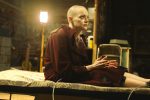How “Deli Boys” is Redefining TV Comedy and Culture by Leaning Into Stereotypes

In an industry often criticized for its slow embracement of representation and diverse storytelling, Deli Boys is a breath of fresh air, serving up a riotous blend of crime, comedy, and representation. A recent panel discussion, featuring the show’s creators and a stellar cast, offers a deep dive into the making of this edgy comedy series.
Deli Boys is a “crimedy” that follows a pair of pampered Pakistani-American brothers Mir (Asif Ali) and Raj (Saagar Shaikh). When their convenience store-magnate father suddenly dies by a lethal golf ball hit, they are forced to reckon with their Baba’s secret life of crime as they attempt to take up his mantle in the underworld. What can go wrong?
From its inception, Deli Boys promised something different. Executive producers Abdullah Saeed and Michelle Nader, alongside director Nisha Ganatra, discuss the delicate balance of weaving together disparate genres while centering underrepresented voices. Saeed, the show’s creator, revealed the surprising journey of the script, initially written as a sample five years ago. “I wasn’t expecting this to be a real pilot on TV,” he confesses. “I shed entirely that expectation. What I learned is that if you trust yourself, something interesting comes out of it.”
He describes the crime, gore, and silly humor in Deli Boys as his “having fun.” It isn’t an earnest look at the difficulties faced by migrants and their famillies, but rather a celebration.
Michelle Nader emphasizes her role in grounding the show’s unique tone. “Balancing it was just something that came naturally from the premise,” she notes, highlighting the inherent comedic potential in the clash of unexpected elements.
Nisha Ganatra recounts the challenge of translating Abdullah’s vision to the screen, especially in navigating the fine line between comedy and violence. She vividly recalls a pivotal scene in the pilot where Lucky (Poorna Jagannathan) shoots a character, a moment designed to subvert typical portrayals of violence against people of color. “I didn’t want to see this brown guy get shot and fall to the ground. I feel like I’ve seen that so much and I just didn’t want to contribute to that,” Ganatra insists.
[More: Abdullah Saeed Relishes His Pakistani-American In “Deli Boys”]
Their solution – covering the actors in blood as a “christening” into a new lifestyle – was a stroke of genius, made even more impactful by what she called the “pitch of Asif’s scream.” Abdullah chimes in, praising Ganatra’s playful directing style, which included an unexpected “3, 2, and didn’t say 1 and just blasted it.”
The stars share their journey to Deli Boys. Sagar recounts his strategic approach to Abdullah, involving a “most expensive blunt [weed]” and a declaration that the role of Raj was his, despite Abdullah initially writing it for himself. Ali playfully chimes in about their immediate, albeit Zoom-based, chemistry read and Sagar’s initial resistance to his casting. “He hated me at first. He tried to get them to not cast me,” Ali jokes. Yet, their on-screen dynamic as brothers is undeniable.
For Sagar, the script speaks deeply to his own life experiences. “That’s totally how it felt with Raj. I feel like I’ve had a life where I’ve been like Raj and a life where I’ve been like Mir,” he shared, finding the “Raj” life “way more fun.” Ali was drawn to the depth of the characters, a refreshing change from often one-dimensional roles for actors of color. “It’s all my favorite things. It’s a hard comedy. It’s action. It has incredible genre stuff. But it’s also allowing these people to have full three-dimensional character arcs, which I have never really had in my career before,” Ali states.
Jagannathan, the Gotham Award winner, discusses what drew her to the fierce and fabulous character of Lucky. Her previous role on Never Have I Ever saw her playing a high school mom, a role that mirrored her own son’s life. Now, with Deli Boys, she felt a visceral connection. “Give me a gun. Give me a gun,” she quips, highlighting the liberation of portraying a strong, unconventional woman. Abdullah reveals that Lucky was originally written as a male “uncle” character, but a transformative experience at a Geena Davis talk inspired him to switch the character’s gender. “My mother, who is a ferocious and badass yet nurturing Pakistani woman, really became the inspiration,” Abdullah explains, noting that Jagannathan and his mom are now good friends.
Michelle Nader elaborates on her contribution to Lucky’s character, particularly in shaping her “fashion, the look, the attitude.” Nader describes Lucky as a character she “needed to write for” because she hadn’t seen such a portrayal on TV – a fierce gangster who is also fiercely loving. Her conviction for Poorna to play Lucky was so strong that she insists, “We’ve got to get Poorna.”
Brian George and Alfie Fuller shed light on their dynamic characters, Ahmed and Prairie. Fuller discusses the expansion of Prairie’s storyline throughout the series, allowing for a deeper exploration of her world. Abdullah praises Fuller’s soulful and grounded portrayal, which brought a nuanced understanding to a character he initially struggled to fully define. “Alfie just does magical things. And the character has this perceptiveness that you brought to it,” Abdullah comments. Brian George, whose character Ahmed was initially envisioned as recurring, took the opportunity to flesh out his role within the supportive environment of the Deli Boys set.
[More: Michelle Nader On Balancing Two Very Different Television Comedies – “Deli Boys”]
A poignant moment arose when Abdullah highlights the significance of having both Brian George and Iqbal Theba, who plays Baba, in the show. “For a lot of us growing up, Babu Bhatt, who Brian played on Seinfeld, was the first Pakistani character I had ever seen on TV. Just them saying, ‘I’m from Pakistan,’ was huge for us,” Abdullah shares. He notes the rarity of two prominent brown actors sharing a screen, a stark contrast to a past where there was often “only one cab driver.”
The panel concluded with a reflection on the show’s cultural impact. Asif Ali expresses his pride in being part of a predominantly brown cast finally getting their moment in roles “that weren’t written for them.” Brian George, playfully asserts his “real actor” status with a British accent. Nisha Ganatra speaks to the liberating experience of being authentically themselves on set, without the pressure of proving their identity. She recalls a scene where Iqbal was improvising in Urdu, making the cast and crew laugh, realizing that their bilingualism was a “superpower on set.”
Abdullah, however, circles back to the show’s core intention: comedy. “For me, the original intention of the script is about jokes,” he asserts, emphasizing the joy of crafting comedic writing. He describes Deli Boys as “an exercise in absurdity,” where life’s serious aspects are approached with a lighthearted touch. “We broach a lot of shows that have hard drugs in them followed by a moment of reflection such as the cost of doing drugs… but not in this show,” he muses.
Michelle Nader echoes this sentiment, praising Abdullah’s singular comedic voice and the collaborative effort to create something “great.” Alfie Fuller shares heartwarming messages from “little brown girls all over the world” who feel seen and inspired by her character. “My people are coming up to me, my people are watching the show, and they’re like, ‘we see you, thank you, sister,'” Fuller shares.
Finally, Poorna Jagannathan encapsulates the show’s unique appeal. “It’s such a new feeling to be on this show, because we’re allowed to just be,” she states. Unlike many shows featuring characters of color that are burdened with “questions of belonging and identity,” Deli Boys allows its characters to simply exist – and be as hilariously “dumb as they possibly can.” Fuller, describing her character as “unbelievably novel,” celebrates the freedom to portray a woman who “loves her family and also loves cocaine. Both can be true at the same time.”
Join the Discussion!
Related Articles
Browse our Videos for Sale
[woocommerce_products_carousel_all_in_one template="compact.css" all_items="88" show_only="id" products="" ordering="random" categories="115" tags="" show_title="false" show_description="false" allow_shortcodes="false" show_price="false" show_category="false" show_tags="false" show_add_to_cart_button="false" show_more_button="false" show_more_items_button="false" show_featured_image="true" image_source="thumbnail" image_height="100" image_width="100" items_to_show_mobiles="3" items_to_show_tablets="6" items_to_show="6" slide_by="1" margin="0" loop="true" stop_on_hover="true" auto_play="true" auto_play_timeout="1200" auto_play_speed="1600" nav="false" nav_speed="800" dots="false" dots_speed="800" lazy_load="false" mouse_drag="true" mouse_wheel="true" touch_drag="true" easing="linear" auto_height="true"]










You must be logged in to post a comment Login